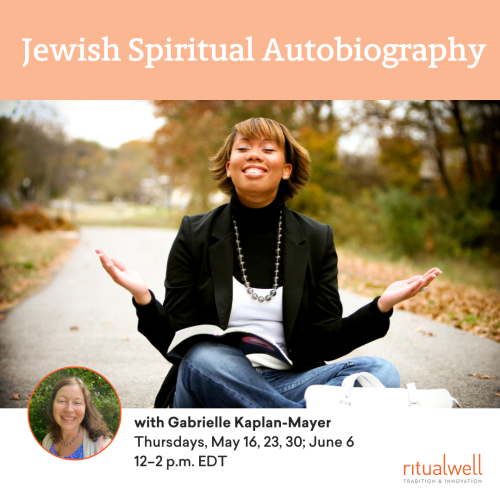But what does it mean to honor our departed beloveds by remembering? For me, it means to give kavodHonor, as in kavod av v’em, honoring one’s parents, kavod ha’met, respect for the dead, kavod hatorah, the honor of the Torah., to let their lives have some weight in ours, so that we can be transformed.
When my mother died unexpectedly three and a half years ago, I was in shock. Although she was 83, she was often so busy she couldn’t find time to talk. She sang with the Raging Grannies, volunteered with political campaigns and at L’chaim (the Jewish lunch program for seniors), championed environmental causes, took daily walks and climbed a ladder to a rooftop lookout with her breakfast tray every morning. When she died, we found a number of little journals where she made notes to herself about whatever delights of nature she had witnessed that day—that the bluebells were up or the spring peepers had started …
When I thought about how I wanted to say kaddishThe Aramaic memorial prayer for the dead. Mourners recite this prayer at every service, every day, in the presence of a minyan (prayer quorum) over the course of a year (for a parent) or thirty days (for a sibling or offspring). The prayer actually makes no mention of the dead, but rather prays for the sanctification and magnification of God's name., it didn’t feel right to join a daily minyanThe group of ten adult Jews needed to read from the Torah and to recite some of the most important communal prayers. In Orthodox communities, a quorum of ten men is traditionally required. Today, most liberal Jewish communities count all Jewish adults as part of a minyan.. There wasn’t one close to me and my mother was anti-religious. I decided the best way to remember her was to take a daily morning walk with a friend and say kaddish by the water in a beautiful and wild park that followed the path of the Wissahickon Creek. Some companions joined me on a weekly basis. On the other days, I walked with friends who offered to support me in my grief or who just wanted to spend time together. “I have an hour from 7:30 to 8:30a.m.,” I would tell them. I had never been able to find the time to walk in the woods, much less to exercise on a daily basis. And yet, because the tradition of kaddish both obligated me and provided the opportunity, I created a sanctuary of time where I could be present to the loss in my life.
Over the next 11 months, I walked the path of grief—from just getting through each day to watching with amazement and gratitude as the ever changing cycle of life unfolded in the woods before me. During my year of mourning, my mother gave me the gift of the woods, of a return to the rhythm of the body and the natural year, and of spending time with loving friends. That year, I learned to listen to the symphony of a river—the different instruments, the high and low notes, the blending. I learned to walk in silence alongside a companion. I learned about letting joy and grief live side by side. I learned that when we ask others for what we need, they often receive what they need in return. From watching the water, I learned that by giving up ego, we can just change course (if not our nature) and flow easily around the obstacles we encounter. I learned how a daily practice in the company of others transforms one’s experience of life. Seeds were planted within me during those walks that still continue to germinate and bloom.
We often talk about memory as a way to honor our parents and the other beloveds we have lost. But what does this mean? For me, it means to give kavod,[1] to let their lives have some weight in ours, so that we can be transformed. Whether we teach ourselves to see differently by remembering the world through their eyes, or grow in wisdom by imitating the ways that they walked through the world, or learn compassion through our struggles to mend the torn pieces they left us, this is kaddish. This is the practice of remembrance.
[1] In the Hebrew, this word means honor, but the root of the word is the same as the word for weight, or heavy.
Rabbi Marjorie Berman lives in northeast Pennsylvania and serves as a spiritual director there and at the Reconstructionist Rabbinical College in Philadelphia.






